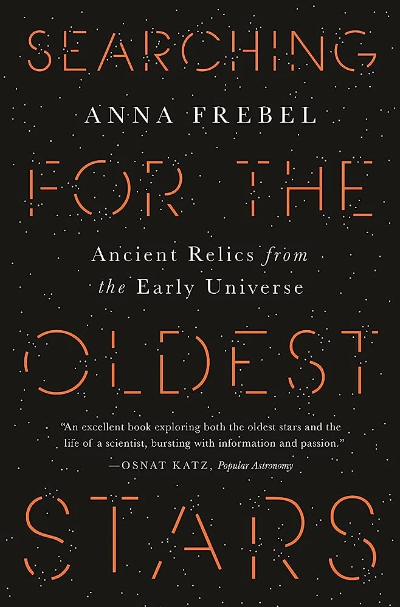

ANNA FREBEL
Astrophysicist, Speaker & Author
- …

ANNA FREBEL
Astrophysicist, Speaker & Author
- …
ANNA FREBEL
Astrophysicist, Speaker & Author
BOOKS!
I'm so excited to share my science and leadership books with all of you!
My books:
STEM Leadership:
How to prepare for and getting into grad school to become a professional scientist
Becoming a Scientist - Strategies to Get Into STEM Grad School (UPCOMING)
Popular Science:
All about my research and telescope observing
Searching for the Oldest Stars - Ancient Relics from the Early Universe
Becoming a Scientist - Strategies to Get Into STEM Grad School
UPCOMING IN 2024!
For college students with STEM interests wanting to attend grad school, “Becoming a Scientist” transforms their experience from guesswork into strategic decisions and certainty.
For years, undergrads students have asked me for advice with their struggles to find information about grad school and science careers. “Becoming a Scientist” fixes this knowledge gap by sharing all there is to know about how to get into grad school and beyond.
If you’re tired of not knowing how to best prepare for your future, it’s time to level up and take your career planning into your own hands. As an MIT professor, I’m delighted to share my wisdom and high caliber career advice with emerging students interested in STEM topics.
Finding trusted information can be stressful. Hunting down all the options and not knowing what to trust could mean that you have to pay a steep price. “Becoming a Scientist” streamlines the entire process for you and provides all the details and strategies so you get the best and most competitive guidance possible. It will change your life!
PREVIEW REVIEWS:
“This has been an incredible resource for understanding every step of the application process.” ~former "Filling the GAPS" student participant
“This was honestly the most helpful [discussion] I could have asked for []. I was very optimistic to find a program that would explain the process [] as I look to take the next step into grad school. [It] was exactly what I was looking for." ~former "Filling the GAPS" student participant
Princeton University Press
Astronomers study the oldest observable stars in the universe in much the same way that archaeologists study ancient artifacts on Earth.
Anna Frebel—who is credited with discovering several of the oldest and most primitive stars using the world’s largest telescopes—takes readers into the far-flung depths of space and time to provide a gripping firsthand account of the cutting-edge science of stellar archaeology. Weaving the latest findings in astronomy with her own compelling insights as one of the world’s leading researchers in the field, Frebel explains how sections of the night sky are “excavated” in the hunt for these extremely rare relic stars—some of which have been shining for more than 13 billion years—and how this astonishing quest is revealing tantalizing new details about the earliest times in the universe.
She vividly describes how the very first stars formed soon after the big bang and then exploded as supernovae, leaving behind chemical fingerprints that were incorporated into the ancient stars we can still observe today. She shows how these fingerprints provide clues to the cosmic origin of the elements, early star and galaxy formation, and the assembly of the Milky Way. Along the way, Frebel recounts her own stories of discovery, offering an insider’s perspective on this exciting frontier of science.
Lively and accessible, this book sheds vital new light on the origins and evolution of the cosmos while providing a unique look into life as an astronomer.
Get it on Amazon here!
REVIEWS:
“[Anna Frebel] makes this crash course in astronomy accessible to stargazers of all knowledge levels. . . . Woven through the science are personal anecdotes from Frebel, which give the impression of a face-to-face lesson with a favorite professor. . . . Frebel offers a handy learning tool for fledgling astronomers and a fascinating, enjoyable look into her own research.” ~Publishers Weekly
“Frebel’s narrative provides a rich picture of the understandings astronomers have gleaned from studying the elements in stars. We are gradually developing a picture of how the elements evolved from the earliest moments of the Big Bang and how these elements were distributed through our Milky Way galaxy, eventually forming the solar system we inhabit today.” ~Laurence A. Marschall, Natural History
“Frebel presents a gripping account of astronomy and the thrill of scientific discovery, making a complex subject accessible to general readers.”
~Dave Pugl, Library Journal
“Edifying, engaging, and ever more reason to be humbled by the starry night, [Searching for the Oldest Stars] is a delight.”
~Matt Sutherland, Foreword Reviews
“One of the glories of astrophysics is the way it combines real-world uselessness with mind-blowing effects on human consciousness. Here, Searching For The Oldest Stars shines. Frebel deals with the evolution of scientific thinking on the nature of the universe, the formation of ideas on how to identify such stars, and the wearisome but hopeful search for individual examples, with real descriptive power. . . . But good popular exposition of specialized knowledge is not that rare–the core of Frebel’s book, and the source of its appeal, is the joy it conveys.” ~Brian Bethune, Maclean’s
“[Frebel] offers an excellent description of how a scientist approaches and works through a research project and how her cutting-edge project fits into the larger view of modern astronomy. Personal details enliven the narrative, and the topic is accessible even to those who choose not to dive deeply into all chapters.” ~Choice
©2024
